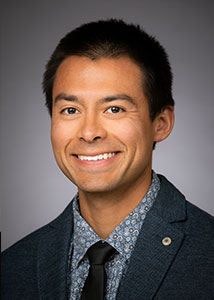Each week, the Daniels Debrief is featuring a researcher who conducts meaningful research that impacts their field and the wider community. Learn more about their work in Q&As with Melissa Archrpru Akaka, associate dean for faculty research. Email Melissa to nominate yourself or a colleague for a future Q&A.

Ben Williams
I’m a statistician. One of the things I like about being a statistician is I feel like I can collaborate with anyone, in Daniels or even outside. For example, I’ve worked with a history professor on text as data. I love that I get to help other people with their data. Maybe someone else has the theory and then I come in and say, “OK, can we prove it with the data?” So I get the data and I run the models or the tests and figure out.
I originally wanted to go into academia to be a professor, because I loved my professors in college, their mentorship and relationships. And I’ve always loved teaching. But then I sort of fell in love with the research process…Now I get to work on problems that maybe people don’t have a solution for. And I’m interested in—and can hopefully have an impact in—a variety of arenas. I really enjoy research.
The most recent project that we worked on was thinking about when you have a peer-to-peer platform, for example, Airbnb or Uber or Turo. The question that we had was: How can you improve what’s called “matching?” Like, if you want to match a buyer and a seller, how do you improve the efficiency or the performance of the matching? We show that, yes, differentiating makes search friction lower, which improves matching. It’s most beneficial in really thick markets, like where there’s a lot of sellers and buyers on Airbnb.
I would love to do more work that impacts societal issues. Whether issues around poverty, justice or unfairness. Solving issues that impact lives is valuable to me and important for society.
I love collaborating. So, I think, continuing to expand my collaborations within the school [is a goal] because I find myself interested in all sorts of things. I think long term about interdisciplinary work because my training is more on the methodology. I love learning about the theoretical underpinnings in other disciplines that I could contribute to, and I think that’s just a win-win for everybody.
